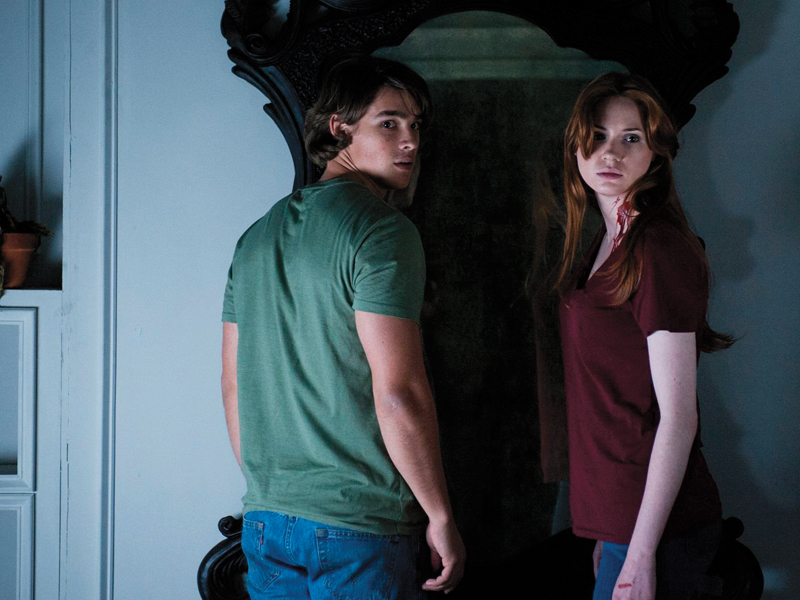
How do you make a typical haunting horror movie seem original? Director Mike Flanagan believes this is done by playing with the minds of the audience and having them not understand anything that’s going on. He demonstrates this in “Oculus,” a film about a haunted mirror that seems to have no way of being defeated. The film thrives on shock value through maximum gore (and a lot of missing teeth) and a few jumps here and there, but nothing much else. There doesn’t seem to be anything creepy, and while Flanagan’s perception tactics were interesting at first, they eventually just made “Oculus” a headache to watch.
Ten years before the beginning of the film’s events, siblings Kaylie Russell (Karen Gillian) and Tim Russell (Brenton Thwaites) encounter a horrific event when they witness their parents’ murder in their home. Kaylie is sent into the foster system, while Tim is falsely convicted for their murder and is sent to stay in a mental facility until his 21st birthday. While he is trying to move away from the past, Kaylie believes that a malevolent force was at work, and instead of being a normal person and destroying it, she is determined to perform experiments on a strange mirror they had in their house to prove her point. The mirror supposedly has 45 previous deaths under its belt, so it may be safe to put some of the blame on it.
For horror movies, cursed objects are the most common features. From “The Shining” to “The Conjuring,” there have always been incredible obstacles (or sometimes multiple movies of incredible obstacles) in the way of defeating the said objects. Sometimes, the cursed objects end up undefeated in the end. But usually there is some backstory about why this object is cursed in the first place. In “Oculus,” there is no backstory at all. The mirror just happens to be haunted. This can be seen as either good or bad in terms of the haunting’s mythos. It can be seen as good because it feels even creepier being left in the unknown. However, it also leaves a bunch of plot holes and unanswered questions. I’m in the middle of this debate; I did like being left in the unknown about its origin for a while, but it left me with a lot of questions in the end about the mirror’s motives, which was a little too frustrating to focus on the good.
One of the most annoying aspects of the film was how sloppy it was with its pacing and editing. We switched between flashbacks and present time, which would have been okay for the first 30 minutes or so, but the fact that the director felt the need to mesh them together was very unneeded. One of the aspects of the haunting was that the mirror was able to manipulate perception so nothing that the audience was viewing could have been real. This also meant that the director went as far as meshing the flashbacks and the present time together, which got extremely confusing the more it went on. Also, certain horrors — such as accidentally biting into a light bulb instead of an apple, or seeing someone when they’re not really there — take the term “unreliable narrator” to an extreme.
Even with the unique form of storytelling that Flanagan utilizes, it doesn’t make up for the fact that there isn’t really a creative story behind it. Gillian and Thwaites don’t even have proper chemistry to make it feel like they’re brother and sister. Their younger counterparts did a better job with that, and even with some scary parts thrown in, nothing could veil their older selves’ stiff acting.
So far, “Oculus” has been compared to movies like “The Conjuring,” but in reality, I can’t see that comparison. Even with a few creepy moments thrown in, it doesn’t come even close to the scale that James Wan’s film is on.
2.5/5








